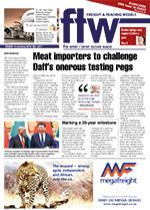The queues of commercial freight vehicles at the port of Durban and borders and checkpoints into southern Africa represent a collective wastage of about US$225 million per annum, according to a recent study by the Federation of East and Southern African Road Transport Associations (Fesarta). Fesarta CEO Mike Fitzmaurice said that according to the association’s calculations, approximately 30% of the US$10 400 cost of moving a container on the North South Corridor from Durban to the Democratic Republic of Congo (DRC) was due to various forms of taxation. “A further 25% of the cost is due to delays caused by border and corridor control activities,” he added. Fitzmaurice agreed with recent comments by the director-general for development in the European Union (EU), Stefano Manservisi, that while the southern African region was on average the most advanced in Africa it was steadily losing its lead on other regions not only in gross domestic product (GDP) growth but also in unemployment and other “structural inequalities”. The EU announced late last year that it had created a fund of 8 billion euros to stimulate regional integration and create an improved investment climate to push for further benefits from the Southern African Development Community (SADC)/EU Economic Partnership Agreement (EPA). But Fitzmaurice said that unless there was “meaningful” regional integration, it was “futile” for the EU and other trade donors to increase their efforts and contributions. He said the SADC cross-border road transport industry operated in a “permanent climate of frustration” at the continued obstacles to intra-regional trade. “As Manservisi noted in a recent article, while SADC has a free trade agreement on paper, the region still faces major impediments to greater actual free trade and regional integration, with bureaucratic blockages and corruption practices at border posts serving as strong examples,” Fitzmaurice highlighted. He said it was “essential” that SADC followed the example set by the East African Community (EAC) and its donor partners where 10 one-stop-border posts (OSBPs) had been successfully implemented, reducing vehicle delays to a maximum of two hours. “They have furthermore made significant inroads in curbing border corruption and have introduced standardised charges,” Fitzmaurice pointed out.
INSERT with IMAGE While SADC has a free trade agreement on paper, the region still faces major impediments to greater actual free trade. – Mike Fitzmaurice IMAGE
.PNG)

